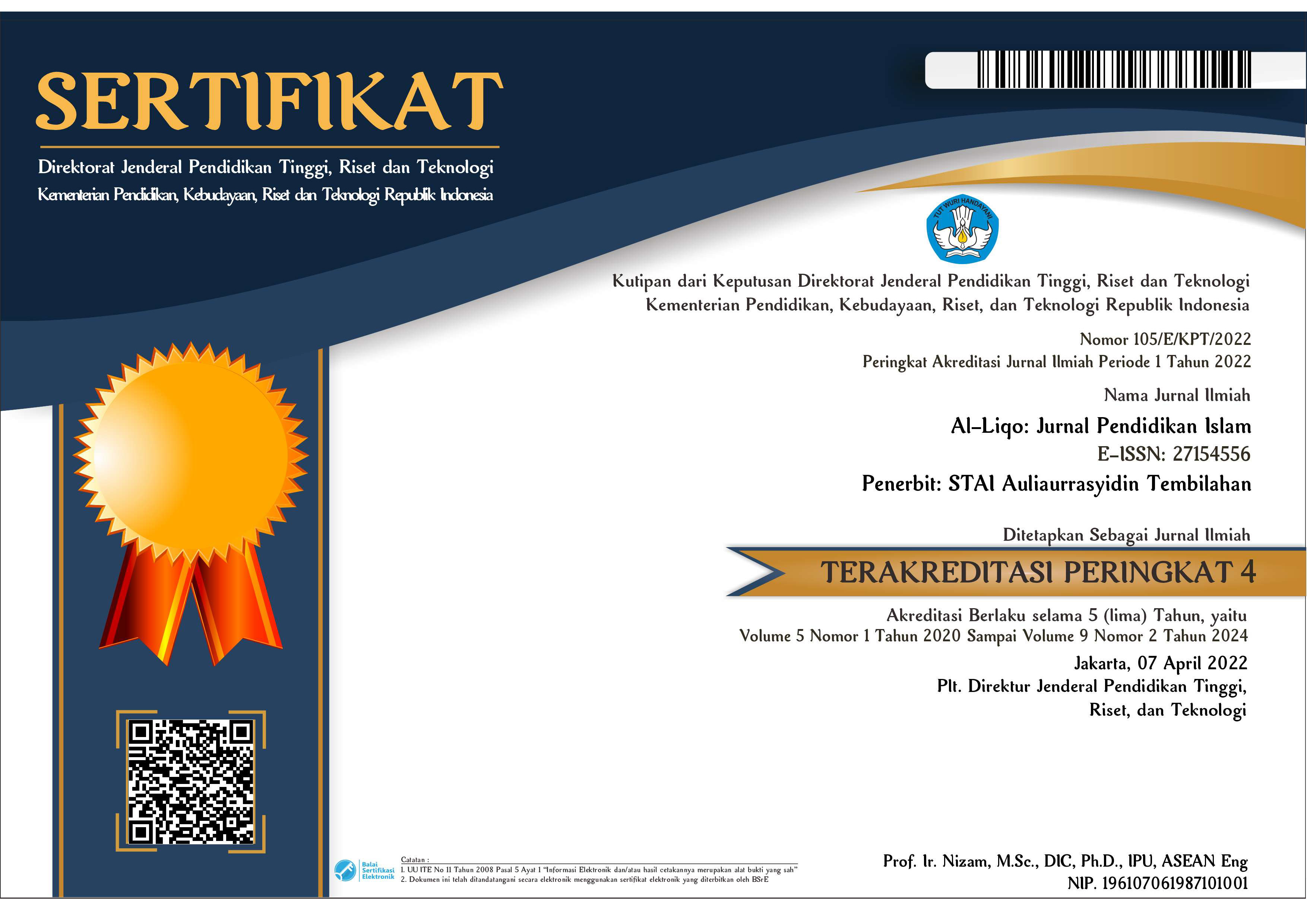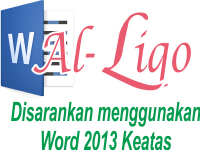Pendidikan Rabbani dalam Al-Qur’an
DOI:
https://doi.org/10.46963/alliqo.v7i2.589Keywords:
Education, Rabbani, Al-Qur’anAbstract
The Qur'an is the Kalamullah which is the guide of life for humans. One of the important themes raised in the discussion of the Qur'an is education. Education in the Qur'an ultimately produces human beings with divine character (Rabbani). The word Rabbani is repeated at least three times in the Qur'an which means Al-Tarbiyah. This study is a literature review using a descriptive qualitative research approach, namely a research approach that seeks to describe a symptom of an ongoing event, in other words this descriptive research is research that takes a problem or focuses attention on actual problems as they were at the time of the research. carried out with reference to primary and secondary sources relevant to this study. Education in the perspective of the Qur'an has the goal that humans have faith and piety to Allah and His Messenger, besides that to build good morals in society through social activities so that by nature the goal of human creation is truly achieved, namely to become khalifatullah on earth. Among the characteristics of humans who have achieved the title of caliph are those who have been able to actualize all of their human potential, so that their usefulness is truly recognized in society.
Downloads
References
Abudin Nata, (1997). Filsafat Pendidikan Islam, Jakarta: Logos Wacana Ilmu.
Adian Husaini, (2018). Pendidikan Islam Mewujudkan Generasi Gemilang Menuju Negara Adidaya 2024, Depok: Yayasan Pendidikan Islam At-Taqwa.
Ahmad Salam, (1992). Ana Alaihi Wa Ashhabi; Dirasat Fi Asbab Iftiraq Al-Ummah Wa Muqawwimat Wihdatiha Al-Syar’iyyah Wa Al-Kauniyah Min Khilal Hadits Al-Iftiraq. Beirut: Dar Ibn Hazm.
Ahmad Tafsir, (2010). Ilmu Pendidikan Dalam Perspektif Islam, Bandung, Rosdakarya.
Amiruddin, (2018). Konsep pendidikan akhlak menurut Mahmud Yunus, Lhokseumawe: Yayasan Madinah Al-Aziziyah.
Al-Raghib al-Ashfahany, Mu’jam Mufradat li AL-Fadz al-Qur’an, Beirut: Daar al-Fikr. Tt.
Katsir, Ibnu, (2008). Tafsir Ibnu Katsir, jilid II, Cet. I; Jakarta: Pustaka Imam Asy-Syafi’I.
M. Sarbini, (2020). Pendidikan Rabbani Untuk Penguatan Karakter Remaja, Edukasi Islam: Jurnal Pendidikan Islam, Volume 09 Nomor 01. http://dx.doi.org/10.30868/ei.v9i01.707.
M. Sarbini, Konsep Pendidikan Robaniyah. Edukasi Islam: Jurnal Pendidikan Islam, Volume 01 Nomor 01. http://dx.doi.org/10.30868/ei.v1i01.11
Manna a-Qaththan, Mabahits fi Ulum al-Qur’an, Riyad: Mantsurat Al-Ashr al-Hadits, tt.
Mardiah, M., & Napratilora, M. (2021). Konsep Pendidikan Karakter Dalam Al-Qur’an Dan Hadits. Al-Liqo: Jurnal Pendidikan Islam, Vuleme 6 Nomor 02, https://doi.org/10.46963/alliqo.v6i2.443
Muhammad Zaki Muhammad Khadr, (2005). Mu’jam kalimat Al-Qur’an al-Karim, Jus 12.
Shalih bin Fauzan, (2017). Kitab Tauhid, Terj. Syahirul Alim Al-Adib, Cipayung, Ummul Quran.
Syed Naquib al-Attas, (2011). Islam dan Sekulerisme, Terj. Dr. Khalif Muammar, Bandung: Instutute Pemikiran Islam dan Pembangunan Insan.
Downloads
Published
Issue
Section
License
Copyright (c) 2022 Yayat Suharyat, Abdul Ghofur, Amiruddin Abdullah

This work is licensed under a Creative Commons Attribution-ShareAlike 4.0 International License.
Authors who publish with this journal agree to the following terms:
1. Copyright on any article is retained by the author(s).
2. The author grants the journal, right of first publication with the work simultaneously licensed under a Creative Commons Attribution shareAlike 4.0 International License that allows others to share the work with an acknowledgment of the work’s authorship and initial publication in this journal.
3. Authors are able to enter into separate, additional contractual arrangements for the non-exclusive distribution of the journal’s published version of the work (e.g., post it to an institutional repository or publish it in a book), with an acknowledgment of its initial publication in this journal.
4. Authors are permitted and encouraged to post their work online (e.g., in institutional repositories or on their website) prior to and during the submission process, as it can lead to productive exchanges, as well as earlier and greater citation of published work.
5. The article and any associated published material is distributed under the Creative Commons Attribution-ShareAlike 4.0 International License







2.png)



